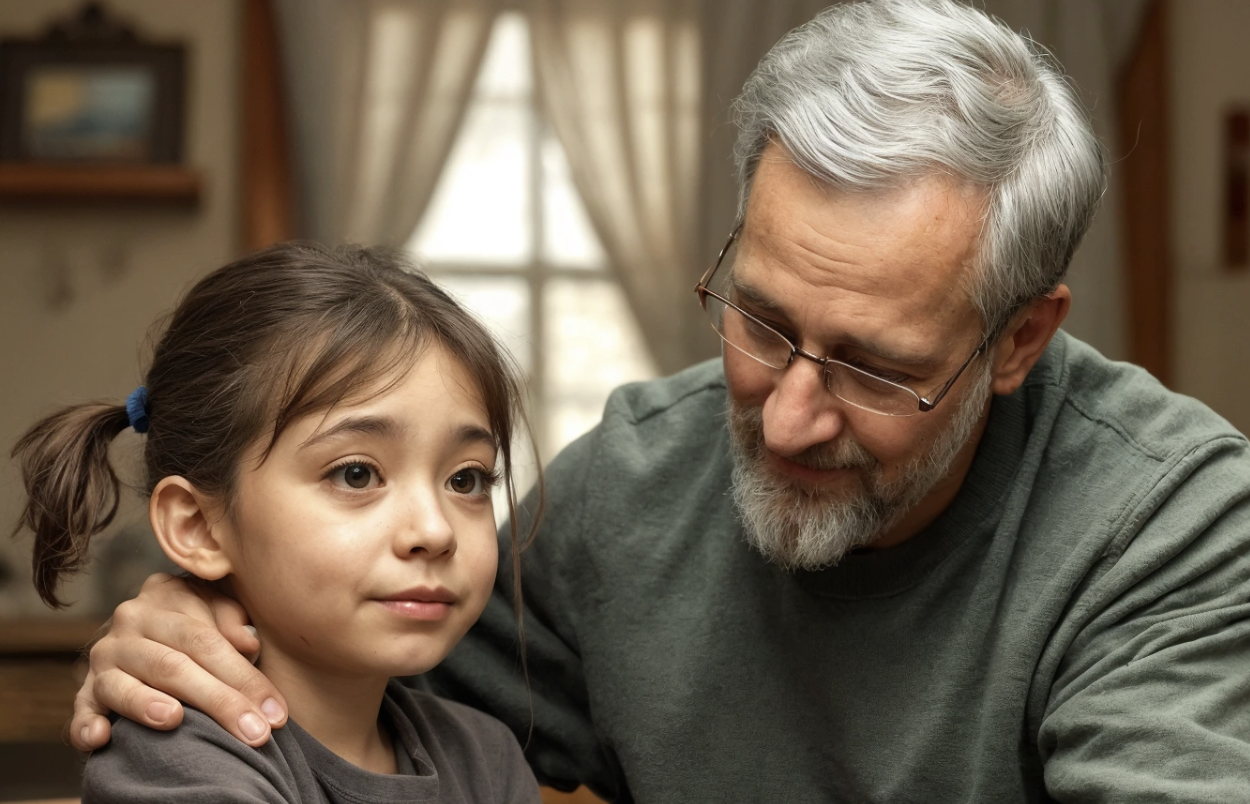On the tranquil outskirts of Voronezh, where life was meant to be peaceful and orderly, Daniil Landyshev, a widower and proprietor of a modest logistics firm, resided with his daughter. He was a respected figure in the community, always proud of his twelve-year-old daughter, Sonya.
Sonya attended secondary school No. 14. Usually lively and bright-eyed, recently she returned home with a subdued demeanor, her school uniform often untidy, marked with bruises on her arms and knees. Her once confident gaze was now shadowed by fear, and her tone had softened to barely a whisper.
Each time he inquired, she insisted, “I just fell, Dad. Nothing serious.” Yet Daniil’s intuition told him otherwise; behind that explanation lay an untold story he could not ignore.
“She breaks down quietly in the bathroom,” confided Margarita Ivanovna, the nanny who had cared for Sonya since infancy. “She thinks no one notices, but the pain is real. She endures it silently.”
From that moment, Daniil took it upon himself to meet Sonya at the door daily. He noticed a recurring scene: the instant she crossed the threshold, an immediate release seemed to overcome her—her posture slackened, steps slowed, and her eyes wandered, lost in thought.
Yet every attempt to open a conversation was met with the same reply: “I’m fine, Dad.”
One evening, Daniil observed Sonya’s backpack abandoned near the entrance. The bag was battered—its strap torn, the base stained with green marks resembling grass, and inside, crooked notebooks with blurred ink stains.
“This isn’t mere wear and tear,” Margarita Ivanovna remarked skeptically, tracing the suspicious marks. “Something’s definitely wrong.”
Overwhelmed with worry that night, Daniil resolved to take an unprecedented step. He retrieved a small, old-fashioned microphone from his desk drawer and concealed it inside the lining of Sonya’s backpack. It wasn’t his desire to spy, but he saw no alternative to uncovering the truth.
The following day, he pressed play on the recording. Initially, it captured typical school sounds—children laughing in the hallway, doors shutting, casual chatter. Suddenly, he heard a sharp thud, then a muffled sigh, and finally, a frightened whisper: “Don’t… don’t touch…”
Stunned, Daniil’s blood ran cold. The noises contradicted the innocent explanations Sonya offered. The bruises were not accidents; they signaled real suffering.
However, the next audio replay obliterated any misconception of helplessness. Sonya was not merely a victim; she emerged as a protector, confronting adversity with quiet courage.
In the voice recording, Sonya firmly said, “Enough. Leave him alone. It’s the second time.”
“He started it,” retorted a boy.
“That doesn’t justify attacking. Step back,” she replied resolutely.
The commotion faded, followed by a whispered, “Thank you…”
“Better me than you. Go to class,” Sonya gently urged.
Daniil was speechless. His usually reserved daughter was annually shielding others from harm, absorbing the blows to ensure their safety. Gradually, it unveiled itself as a defining characteristic of her personality.
He recalled a memory of his late wife, Alina, who had once taught their daughter, “If someone is suffering, be the one to recognize it. Simply be present.”
Indeed, Sonya had embraced this lesson even from early childhood: comforting classmates, standing up for peers who struggled. Now, Daniil saw how these instincts had flourished into a purposeful mission.
- She surrounded herself with children who trusted her guidance.
- She was observed walking home with classmates, discussing ways to support others.
- Her diary revealed thoughtful notes on helping friends feel safe and confident.
Determined to confront the issue, Daniil approached the school principal, Irina Vladimirovna, who, despite her weary dismissal, had yet to acknowledge any official reports of bullying.
“There is a problem at this school,” he asserted.
“Children differ, and we have no formal complaints,” she countered.
“My daughter bears bruises standing up for the humiliated daily. This is the undeniable truth,” he insisted.
Despite the principal’s skeptical response, Daniil left motivated to act rather than accept silence.
A few days after, Daniil found a note slipped into his mailbox. Written in shaky childlike handwriting, it read:
“Your daughter is the bravest person I know. When I was trapped in the janitor’s closet, I thought no one would rescue me. But she came, opened the door, and said, ‘Let’s go home.’ Now I’m not afraid of the dark, because I know she’s near.”
The letter bore no name — just a hand-drawn open palm.
When Daniil shared the note with Sonya, she held it gently, eyes shimmering with emotion.
“Sometimes I feel like my efforts go unnoticed… that no one sees,” she confessed.
He moved closer, his voice steady and proud:
“What you do matters greatly, Sonya. More than you realize. Always has.”
Soon, Sonya agreed to address the school assembly—on the condition that everyone who supported her joined her on stage.
“We aren’t heroes,” she stated. “We’re just present when it’s frightening. When someone cries, we stay. When they’re silenced, we speak for them. That’s all.”
Her words stirred the room into applause, breaking through the silence. Suddenly, anonymous messages of gratitude began to appear throughout the school. Students volunteered to watch over and encourage kindness. Parents, including Daniil, gathered to support this awakening, though they were unsure about the full extent of change.
Evenings transformed into meetings, either in person or online, where stories, anxieties, and hopes were shared openly.
Sonya sought no recognition or accolades. Her unwavering focus remained on those still struggling to believe in hope and light.
In summary, this story reveals how a resolute young girl, motivated by compassion, took a stand against bullying, inspiring a community to break silence and nurture kindness. Her father’s efforts to uncover the truth behind her bruises unveiled a profound narrative of courage, sacrifice, and collective change.
